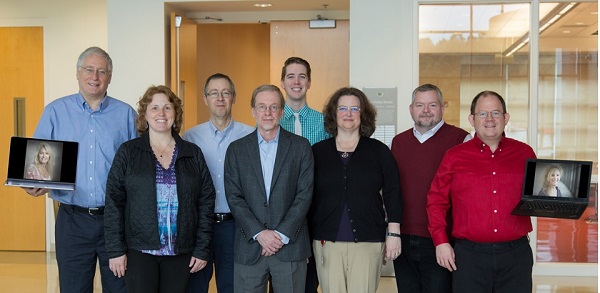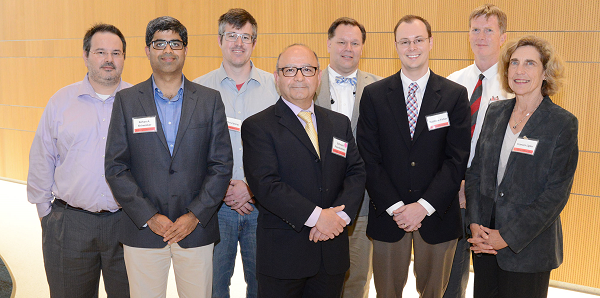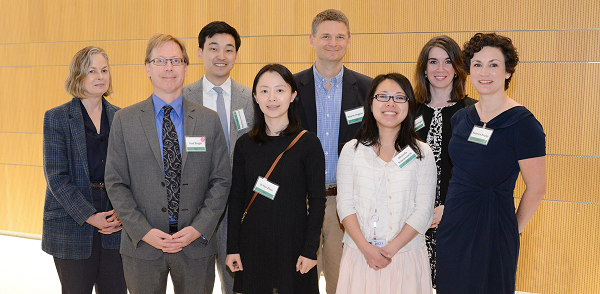Historical Information: Game-Changing Research Incentive Program (GRIP)
In January 2016, the Office of Research and Innovation (ORI) — in conjunction with RTI International (RTI) and the Kenan Institute for Engineering, Technology and Science (KIETS) — announced a new, large-scale seed-funding program to stimulate the growth of interdisciplinary research at NC State. This initiative allocated $2.3 million over three years to fund exceptional research teams and projects that spanned NC State's colleges. GRIP was intended to incentivize and support visionary research ideas that would result in large-scale extramural funding, award-winning research impacts, and first-class interdisciplinary graduate education and training.
The Award Process
GRIP awards followed a three-phase application process — including a two-page pre-proposal, selection of up to 10 pre-proposals to submit eight-page final proposals, and a round of oral presentations for the finalists. A review team consisting of content area experts and administration reviewed all applications. On December 8, 2016, ORI announced the teams who were selected as winners of GRIP awards.
GRIP Kickoff
The GRIP Kickoff meeting was held March 1, 2017, in The James B. Hunt Library, with presentations from each of the four funded projects. Former Vice Chancellor for Research and Innovation Alan Rebar and RTI International President Wayne Holden started the program with their visions of the GRIP program and the impact that collaborations such as these have on the research community.
The response to the GRIP call for proposals was overwhelming — ORI received 59 pre-proposals, spanning all 10 of NC State’s academic colleges, that included more than 300 NC State faculty and involved talented collaborators at RTI, Duke, and UNC-Chapel Hill. Following oral presentations by the finalists, the GRIP scientific and administrative review panel deliberated and debated the merits of each proposal team. It was a difficult decision, but in the end, the following project teams were chosen:
Water Sustainability through Nanotechnology: Nanoscale Science and Engineering at the Solid-Water Interface
Primary Investigators
David Berube, Douglas Call, Jan Genzer, Jacob Jones, Detlef Knappe, Yaroslava Yingling, Mohammed Zikry (NC State); Young Chul Choi, Khara Grieger (RTI); Susan White (WRRI); and many other participants at NC State, RTI, UNC, and Duke

Synopsis
An interdisciplinary team assembled by the Research Triangle Nanotechnology Network (RTNN), the UNC System’s Water Resources Research Institute (WRRI), and RTI International (RTI) proposes a fundamental and comprehensive research development effort in nanotechnology-enabled systems for water sustainability (e.g., biofouling on desalination membranes), energy extraction from wastewater, and nanotechnology-based water monitoring sensors (e.g., nano-sensors for precision agricultural engineering and space applications).
Computer Science for All K-12 Students
Primary Investigators
Tiffany Barnes, Glenn Kleiman, James Lester, Eric Wiebe (NC State); Kimberly O’Mally (RTI)

Synopsis
The proposed project will establish NC State as a national center addressing this critical need to provide pre-college students with foundational knowledge and skills in Computational Thinking. The partnership of NC State’s Friday Institute (FI), College of Education, Center for Educational Informatics (CEI) and Department of Computer Science, along with the RTI Center for Evaluation and the Study of Educational Equity, is uniquely positioned to take a broad-based, systemic approach to addressing this challenge by fostering state-of-the-art educational innovations, conducting design research in partnership with K-12 schools, developing and implementing scalable and effective approaches to preparing teachers, and working with state government and business leaders to make NC a model in bringing computational thinking and digital-age workplace skills into K-12 education.
3D Printing of Fibrous Tissue Engineered Medical Products: A New Paradigm for Tissue Biofabricaton and Therapeutics
Primary Investigators
Matthew B. Fisher, Frances S. Ligler, Kyle G. Mathews, Benoit Maze, Behnam Pourdeyhimi, Rohan A. Shirwaiker (NC State); Bruce Cairnes, Shawn D. Hintgen, Jeffrey T. Spang (UNC-Chapel Hill)

Synopsis
3D printing is driving major innovations in many areas, such as engineering, manufacturing, and medicine. While currently used primarily to manufacture prototypes and small products, recent innovations have enabled 3D printing of biocompatible materials, cells, and supporting components on fibrous structures to form complex functional living tissues. However, there is need for mass customization. This proposal seeks to extend the recent innovations in 3D printing and bioprinting by developing a fiber-based printing system that underpins the essential need for mass customization technologies, and open up new interdisciplinary areas of research for healthcare, engineering, and other applications.
The NCSU/RTI Program in Genetic Discovery and Prediction
Primary Investigators
Marie Davidian, Alison Motsinger, Spencer Muse, Jung-Siddhartha Thakur, Ying Tzeng, Fred Wright, Zhao-Bang Zeng, Yi-Hui Zhou (NC State); James Balhoff, Rebecca Boyles, Carol Hamilton, Wayne Huggins, Stephen Hwang, Michelle Krzyzanowski (RTI)

Synopsis
This proposal seeks to create a multi-faceted three-year Program in Genetic Discovery and Prediction (PGDP), initially organized around a demonstration and feasibility pilot for a highly ambitious effort the team calls the “1000 GWAS Project.” The project will compile an unprecedented number of publicly available genome-wide association studies (GWAS, representing hundreds of thousands of patients). These studies have been used to identify genetic variants that predispose humans to disease and can be used to predict patient outcomes. The project will re-analyze the combined data using the latest methods for genetic analysis and quality control, combined with new linkages to standard measures for phenotypes, as well as data on clinical covariates and exposures. Finally, the project will feed back into public repositories, providing an open-source analysis pipeline and community resource for ongoing research. The unprecedented data compilation and comprehensive analysis will reveal subtle and more complex interactions between genes, environmental exposures, and resulting disease and treatment outcomes.
GRIP Review Committee
ORI would like to offer special thanks to the scientific and administrative review panels for their participation in this program. Without their time and expertise, this effort would not have been possible.
NC State Reviewers
Alan Rebar, Vice Chancellor for Research, Office of Research and Innovation
Ruben Carbonell, Director of the Kenan Institute of Engineering, Technology and Science
Denis Gray, College of Humanities and Social Sciences (Psychology)
Pierre Gremaud, College of Sciences (Mathematics)
Jon Horowitz, Assistant Vice Chancellor for Research Infrastructure, Office of Research and Innovation
Albena Ivanisevic, College of Engineering (Materials Science and Engineering)
Frank Louws, College of Agriculture and Life Sciences (Plant Pathology)
Denis Marcellin-Little, College of Veterinary Medicine (Clinical Sciences)
Pradip Pramanik, Director; Proposal Development Unit
Coby Schal, College of Agriculture and Life Sciences (Entomology)
Ron Sederoff, College of Natural Resources, Forestry and Environmental Resources
Mladen Vouk, Associate Vice Chancellor for Research Development, Office of Research and Innovation
Alyson Wilson, College of Sciences (Statistics)
RTI Reviewers
James Gibson, Chief Operating Officer
Terri Lomax, Executive Vice President of Discovery, Science and Technology
Jaqueline Olich, Director of University Collaborations
Key GRIP Information and Materials
Please see the links below to the full RFP and other important information:
- Full Request for Proposals (PDF)
- Cover Page Template
- Budget Template
- Biosketch Template
- Webinar presented by Dr. Jon Horowitz on Thursday March 3, 2016
- GRIP pre-proposal metrics, including a list of the 10 teams invited to submit full proposals
- Publishing with RTI Press